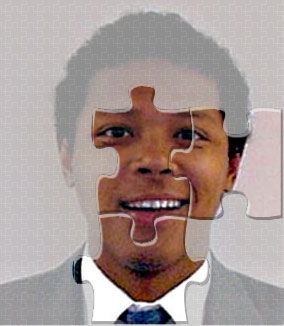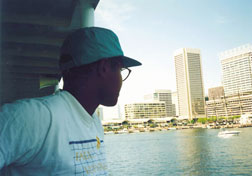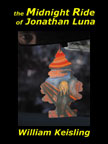A black perspective on
the murder of Jonathan Luna'One of the things young African Americans are repeatedly told while growing up (at least my generation) in America is that you have to be better than those of the dominant cultural group.
The defining logic here is that since you did things 'by the book,' you could not, by any fault of your own, be accused of doing the wrong thing; you did it by the book; you did it 'your way,' not theirs.'
by J. Simple
Bill Keisling's excellent essay, "Who You Gonna Call?" a reading, as he says, "of the tea leaves floating by," and his book, The Midnight Ride of Jonathan Luna, aren't just fascinating reading. Keisling offers the only plausible scenario to date, based on available evidence, of the brutal death of slain federal prosecutor Jonathan Luna.
Jonathan Luna takes in Baltimore's Inner Harbor.
As Keisling's ongoing work indicates, to understand what happened to Jonathan Luna, we must have a more complete understanding of Jonathan Luna, the man (small "t," small, "m"), and his motivations. As Keisling asks, Who was he? The "victimology" summation of his profile and the understanding of Luna's friend, Danny Rivera, make for a better picture of who "Joey" was.
Keisling writes:
"One of the enduring mysteries of the case is why a normally fastidious, sharp and competent trial lawyer like Luna made so many glaring and obvious blunders in the courtroom in the last hours and days of his life. Luna's seeming blunders led the judge to order an inquiry into the FBI.
"At trial, Luna found himself prosecuting a case involving FBI negligence. A paid informant, Warren Grace, was allowed to continue dealing heroin while under FBI supervision, the court record shows. His FBI handler, Special Agent Steve Skinner, working with the 'Safe Streets Task Force,' didn't seem to care that Grace jumped home confinement and shot up his neighborhood. Neighbors' repeated calls of concern and outrage were ignored, Luna saw. When the Dawsons' house finally burned down, killing all seven in the family, Skinner's 'Safe Streets Task Force' was no where in sight. Instead, Skinner's informant was found with heroin on the day the Dawsons' house burned. Over the months before their deaths, the Dawsons had called 911 thirty-six times for help. No help came from the 'Safe Streets Task Force.' Meanwhile, the record shows, Skinner's drug task force informant was himself dealing heroin.
"'Joey couldn't have liked that,' his friend says. 'These guys were out of control. That's not what Joey was about. He really wanted to help people. He came from the Bronx, from a neighborhood like that himself.' Victimology. By making obvious blunders in the case, his friend suggests, Luna forced the judge to hold an inquiry, to make Skinner and his drug task force accountable. Could this have led to his murder?
"'You have to understand Joey,' Rivera told me. 'He was sly, and extremely smart. He didn't always do things straight on. He was smart enough to sometimes work below the surface.' He goes on, 'Joey couldn' t have liked that stuff Skinner and the others were pulling. I know Joey. But what was he going to do about it? Don't you see? He was trying to expose them.'
"'What?' I said, thunderstruck.
"'That never occurred to you?' he said, surprised. 'That stuff about leaving things back on his desk, and not knowing how to introduce evidence. Come on. I've been with Joey in court. He was sharp. That's not Joey.'"
Luna's 'threatening behavior'
I'm surprised also. This is the only plausible conclusion I can arrive at given what facts are currently available. What else can explain Joey's stonewalling behavior? Joey stalls to the point that Judge William Quarles, himself once a young, black prosecutor, has to threaten to talk to Luna's boss, U.S. Attorney Tom DiBiagio, and kick off an investigation. This would be the penultimate discharge notice in Joey's own file favoring dismissal. If that is what Joey Luna was after, not his firing for poor performance, but an investigation, apparently, Judge Quarles was too fond of Joey to set the investigation in motion. Instead, he lets Joey slide yet again seemingly because he favored the handsome and skilled attorney; probably, also because Joey reminded Quarles of his own youthful days as a prosecutor.
'I surmise that Joey was building a dossier in his office to present to and testify before the House Government Reform Committee which, as Keisling points out, was having hearings, at that very moment, on this very subject -- Bureau complicity in drug dealings, mishandling informants, thefts, corruption, wrongful imprisonment, and murder.'
I believe that from the perspective of Agent Steve Skinner and his fellow member of the "Safe Streets Task Force," Baltimore Detective Todd Moody, looking on from the courtroom audience, Joey's behavior is inexplicable, threatening, and dangerous. Just as the behavior of Shakespeare's Hamlet must have appeared "dangerous" to Rosencrantz and Guildenstern. I surmise that Joey was building a dossier in his office to present to and testify before the House Government Reform Committee which, as Keisling points out, was having hearings, at that very moment, on this very subject -- Bureau complicity in drug dealings, mishandling informants, thefts, corruption, wrongful imprisonment, and murder. In this case, they concealed the murder of Alvin "L" Jones. I suspect Joey was hugely distracted by this fact, and the fact, just across the Potomac River in D.C., Joey might find a way out and redemption if he just had more time.
Motive, means, opportunity
Who had motive, means and opportunity to kill Joey Luna? Let's consider "history, moment and milieu," in order to find out cui bono ? or "who stands to profit?" At the very least, it's a good exercise. A history of the Bureau, this moment in time, and the milieu of which Joey was a member, among whom were those who didn't like him. In other words, who had the "motive, means, and opportunity," to do this in such a "Mr. Clean" fashion. No one but a trusted "professional," in my view, could have gotten that close to Joey to pull it off. Danny's assessment of Joey confirms this view. Joey knew how to negotiate his environment, and, probably, because he was so smooth and comfortable in it, someone didn't like him because they sensed he felt himself above this kind of corruption.
Keisling writes, "Rivera tells me, 'Joey was both street and book smart. And that made him dangerous to some people. Joey grew up in the projects. There's a scam running on every corner here. Joey just didn't walk into a street trap. He would have sensed that. And he was also a marathon runner. He could have just run away from them. Joey had to have been tricked, by someone he trusted.'"
"Someone he worked with, no doubt. And Luna worked in law enforcement."
'Police have killed their own'
Writer David Lindorff, author of Killing Time: An investigation into the Death Row Case of Mumia Abu-Jamal (Common Courage Press, Monroe, Maine, 2003), writes, "Police have killed their own. And there are a couple of cases of Philadelphia police officers who were talking to federal prosecutors being subsequently shot and killed. But the standard modus operandi for police executions has been for them to occur in a dark part of a park or alleyway, out of view of anyone -- often with the officer's own gun used so as to make it look like a suicide." (Emphasis mine.)
The problem is, as Lindorff expresses it, people find it hard to believe that the police (or the FBI for that matter) would kill, or be complicit in framing and killing innocent people.
Simply, cow dung.
I suspect that this is how some will receive a similar hypothesis of Joey Luna's death.
Again, we must ask ourselves, Who was Joey Luna? What's his victimology, at least from my (one black man's) perspective?
'Almost any obstacle'
Joey Luna seems to be a man who, because of who and what he is, wouldn't want to do something that would leave himself vulnerable later to prosecution; he wouldn't be left holding the bag. After all, he's a lawman, a black lawman and if anything, he would know better. That is why I suspect that Joey Luna's mother and father wit (wisdom), and his street smarts, guided him in assessing how to maneuver the maze that he found himself in during the prosecution of his last case. As his friend, Mr. Rivera, puts it, Joey was no fool.
'Better than' means study harder, longer, 'do the right thing,' always be respectful, say 'Yes sir' and 'No ma'am.' The theory is that by dent of hard work, diligence, and perseverance, one will be prepared and better able to overcome almost any obstacle placed in your path.
One of the things young African Americans are repeatedly told while growing up (at least my generation) in America is that you have to be better than those of the dominant cultural group. "Better than" means study harder, longer, "do the right thing," always be respectful, say "Yes sir" and "No ma'am." The theory is that by dent of hard work, diligence, and perseverance, one will be prepared and better able to overcome almost any obstacle placed in your path. So the defining logic here is that since you did things "by the book," you could not, by any fault of your own, be accused of doing the wrong thing; you did it by the book; you did it "your way," not theirs.
Joey Luna was, by his appearance, self-possessed of just such assumptions African Americans, especially, those so-called AA male children, are instilled with. This is imparted in order to shield them from the terrible assault on their personalities, their beings, they will experience growing up in "Amerikkka," without instilling fear by telling them outright their lives are endangered. It was/is a "survival technique" given the history of AA male children here to this day.
I suspect that had Joey been a Caucasian, a "white" male, a real member of that exclusive club, rather than an "honorary white," he would still be alive today. Why do I say this? Because Joey was a black man, proud and accomplished, with a seemingly independent streak, who walked to the beat of a different drummer, envy comes to mind, whether personal or professional. And one of the things humans, who perceive themselves of lesser constitution than Joey Luna, dislike in African Americans is a self-confident, self-conscious black man, especially one who flaunts his "imagined" superiority. They imagine that this guy needs his coattails pulled; he needs knocking down a notch or two.
A professional envy
"Black men are held to higher standards than white men in all cases and kept under closer scrutiny by the media, the police, the courts, officials in government and business." Thus surmises Justine Rector in her book Fear of African American Men: The Four Fears of White Men (1998), page 17. The four fears are strength, intelligence, sexuality, and anger. Moreover, writes Rector, "A significant finding is that it did not matter too much what the status of the black man was: if he were a hard core criminal or a moral, productive, erudite man, committed to gaining freedom and a decent life for his race, he could be hounded and brought down like a common criminal. Whether he possessed one or all four of the Four Fears made little difference." Page 3.
Joey Luna seemed to possess at least the first three, if not all four.
There was a poster during the 1970s that read: "In every Negro there is a Black man." The poster showed a strong muscular black man tearing off a suit and tie with an attached skin of an Uncle Tom. The difference here is one between Joey Luna and Clarence Thomas; a Black Man, and an Uncle Tom. Clarence Thomas is an "honorary white," while Joey Luna is dead.
An admiring envy
The difference here is one between Joey Luna and Clarence Thomas; a Black Man, and an Uncle Tom. Clarence Thomas is an 'honorary white,' while Joey Luna is dead.
I once had a Caucasian female friend, to my surprise, tell me how she admired my brown skin. This, of course, made me feel good. It wasn't until years later when I read Mark Twain's remarks about how he thought Caucasians ugly without a darker pigment. Of course, I had never imagined that even some Caucasians thought such things even when my friend commented on the pigmentation of my skin, not until I sensed the lamenting, genuine envy in Twain's comments. Then Imam Malik El Hajj El Shabazz's (Malcolm X) thesis hit me with a jolt: You will never understand why white people look at you the way they do if you don't know your history. (I'm paraphrasing and telescoping here.)
Of course, Imam Shabazz meant more than pigment. He was talking about civilization, KMT (Egyptian), African civilization, back then, compared to Western civilization today. I believe, either in that speech or another, he quoted or alluded to the French traveler and savant Comte F. C. de Volney's travels in Syria and Egypt during the years 1783, 1784, and 1785 (Paris: 1787):
"How are we astonished...when we reflect that the race of negroes, at present our slaves, and the objects of our contempt, we owe our arts, sciences, and even the use of speech! ...[W]hen we recollect that, in the midst of these nations, who call themselves the friends of liberty and humanity, the most barbarous of slaveries is justified; and that it is even a problem whether the understandings of negroes be of the same species with that of white men!"
Volney, says an unreconstructed, thoroughly "pre-modern" classicist, "was amazed to discover that the population of that country (KMT) resembled the mulattos (sic) he had seen in Europe." And while Volney was a respected savant and aristocrat his notion was unacceptable. Imam Shabazz undoubtedly knew of Volney's work.
The point of this is that Joey Luna, while his cultural trajectory was more complex than this linear representation of "the Black Experience," (since he was African American, Philippine, with a Latin veneer, and an American), appeared to be confidently grounded in his cultural heritage.
But having said that, Joey Luna also seemed a person of the temperament who was generally wise enough not to flaunt his knowledge. He appears to have struck a balance. But even this type of AA man, is still a "nigga" to the envious, as opposed to an admiring, African American or Caucasian. And I sense it played a part in his unfortunate demise. In a racist culture, you're damn if you do, and damned if you don't.
M. Wesley Swearingen's book FBI Secrets: An Agent's Expose, illustrates just how this exclusive "security mentality" and culture regards African American men. Says FBI Supervisor Dred Scott, "All black men ought to be in jail." A 1960s and 1970s observation had it that progressive AA men were either dead, in prison, or in exile. The alternative was the status of an Uncle Tom, a homosexual, or "honorary white." These were the future prospects for black men in America, either part of the problem or part of the solution. It was perhaps this either/or dichotomy Clarence Thomas and Shelby Steele were reacting to or rebelling against. No doubt, Joey Luna was walking a tightrope in his own milieu.Who you gonna call?
Who you gonna call, indeed? The Guardians? And who's guarding them?
Consider this: The FBI is handling the official investigation of Luna's death. The FBI is implicated in Joey's death/murder. At the very least, in Luna's case, there was misbehavior, irresponsibility, lawbreaking, and malfeasance on the part of the FBI that the Bureau does not want the American people, let alone Congress, to learn about. Luna's death, moreover, obviously cannot be fully investigated unless the investigators are willing to lay all the cards on the table.
Under the circumstances the situation would call for the empowerment of an unbiased, independent investigator (special prosecutor) to look into the case (and perhaps that of missing Pennsylvania District Attorney Ray Gricar, for similar reasons).
Mark Twain and Ulysses S. Grant's memoirs
Keisling concludes his essay "Who You Gonna Call?" by writing, "While others stood in denial, or ran away, Mark Twain said, Ulysses Grant had understood the emergency and began to stamp out the fire. Mark Twain believed it was his solemn obligation as an American now to come to the aid of General Grant. The Personal Memoirs of U.S. Grant was published to enormous commercial and critical acclaim, and restored the family fortunes of both Grant and Clemens."
What Twain did with Grant's memoirs, Keisling in a way has done, and is doing, with Luna's life and memory. This is a worthy cause and Keisling ought to be commended for doing it.
J. Simple is a nom de plume for a writer who lives in Pennsylvania.


